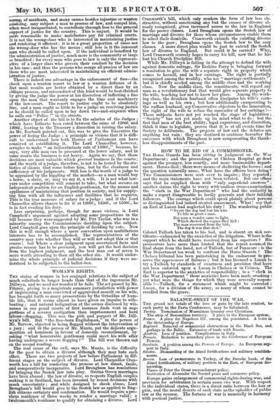WOMAN'S RIGHTS.
TICE status of woman in her conjugal relations is the subject of much solicitude to longer heads than that of the ingenuous Mr. Dillwyn, and we need not wonder if he fails. The act passed by Mr. Fitzroy,. giving to a magistrate summary jurisdiction with power of imprisoning a man convicted of aggravated assault on his wife, has brought forth so many prosecutions by the Griseldas of hum- ble life, that it seems almost to have given an impulse to wife- beating ; and natural indignation at the scenes disclosed by wit- nesses in our penal courts of first instance finds vent in sug- gestions of a severer castigation than imprisonment and hard labour—flogging. This was the ith and purport of Mr. Dill- wyn's bill. But "the free-born Englishman," in the person of Mr. Barrow, objected to being flogged without the intervention of a jury ; and in the person of Mr. Muntz, put the delicate argu mentum ad hominem in favour of domestic reconcilement, by asking " what honourable gentleman could meet his wife after having undergone a severe flogging ?" The bill was thrown_ont on the second reading. The real cause of the evil, says Mr. Muntz, is the difficulty for the poor to obtain a divorce although they may hate each other. There are two projects of law before Parliament in dif- ferent stages on the subject of divorce. Lord Chancellor Cran- worth has a bill for rendering the process at law direct, facile, and comparatively inexpensive. Lord Brougham has resolutions for bringing the Scotch law into play. Gretna Green marriages have been abused ; the law of divorce, as respects English couples seeking it in- Scotland, has been invested by recent decisions with much uncertainty ; and while designed to check abuse, Lord Brougham's bill would give to the Scotch law as applied to Eng- lish citizens certainty and confirmation. He would require a pre- vious residence of three weeks to render a marriage valid; a twelvemonth's residence to qualify for obtaining a divorce. Lord Cranworth's bill, which only renders the form of law less ob- structive, without sanctioning any but the causes of divorce al- ready recognized, gives increased access to the law in England for the poorer closes. Lord Brougham opens the Scotch law of marriage and divorce for those whose circumstances enable them to select their domicile. Cranworth extends the existing divorce law to the poor; Brougham opens the Scotch law to the easy classes. A more direct plan would be just to extend the Scotch law of divorce to England. But could it be carried? Why, Lord Cranworth scarcely hopes to carry his bill, now that he has lost his Church Discipline Bill. While Mr. Dillwyn is failing in the attempt to defend the wife against domestic outrage, Sir Erskine Perry is bringing forward a resolution to give the wife a separate right in property which comes to herseH, and in her earnings. The right is partially recognized among the wealthy, who use "marriage-settlements " • but it is chiefly needed among the middle class and the working class. Now the middle class, the constituents, will regard any man as a revolutionary fool that would give separate property to the wife, teaching her not to know her place. Among the work- ing class, the drunken husband often dissipates his wife's earn- ings as well as his own ; but how additionally exasperating to the ruffian husband, say Conservative objectors to the innovation, the right of the wife to refuse the surrender of her earnings!— These subjects have not yet reached. the stage of legislation ; " Society' has not yet made up its mind what to do : but the fact that men of the best ability, legal experience, and discretion, think it time to legislate, proves that it is at all events time for Society to deliberate. The projects of law and the debates are anything but vain : they are destined to continue hereafter the successes with which Brougham is now compensating the thank- less disappointments of the past.


























 Previous page
Previous page